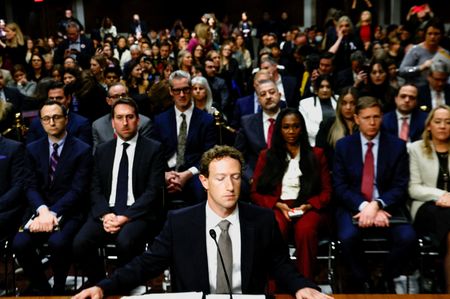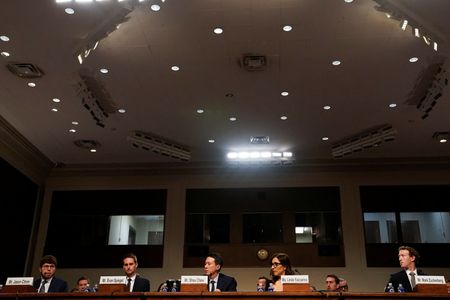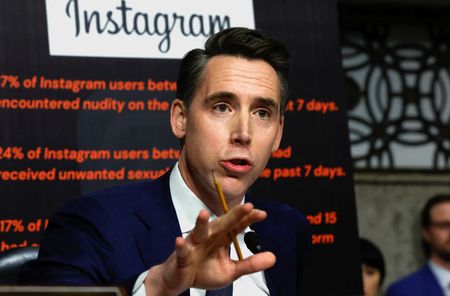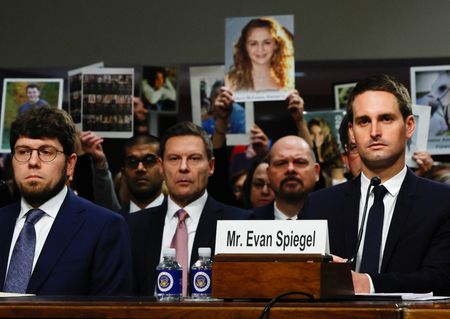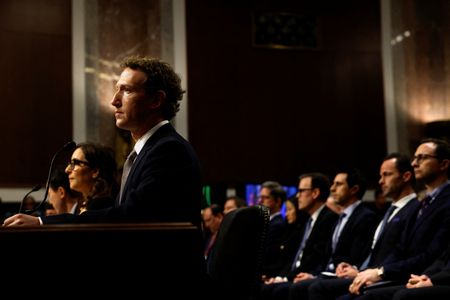By David Shepardson and Makini Brice
WASHINGTON (Reuters) -U.S. senators on Wednesday grilled leaders of the biggest social media companies and said Congress must quickly pass legislation, as one lawmaker accused the companies of having “blood on their hands” for failing to protect children from escalating threats of sexual predation on their platforms.
The hearing marks the latest effort by lawmakers to address the concerns of parents and mental health experts that social media companies put profits over guardrails that would ensure their platforms do not harm children.
“Mr. Zuckerberg, you and the companies before us, I know you don’t mean it to be so, but you have blood on your hands,” said Republican Senator Lindsey Graham, referring to Meta CEO Mark Zuckerberg. “You have a product that’s killing people.”
Zuckerberg testified along with X CEO Linda Yaccarino, Snap CEO Evan Spiegel, TikTok CEO Shou Zi Chew and Discord CEO Jason Citron.
Senator Dick Durbin, the Judiciary Committee’s Democratic chairman, cited statistics from the National Center for Missing and Exploited Children nonprofit group that showed skyrocketing growth in financial “sextortion,” in which a predator tricks a minor into sending explicit photos and videos.
“This disturbing growth in child sexual exploitation is driven by one thing: changes in technology,” Durbin said during the hearing.
As the hearing kicked off, the committee played a video in which children spoke about being victimized on social media.
“I was sexually exploited on Facebook,” said one child in the video, who appeared in shadow.
In the hearing room, dozens of parents held pictures of their children who they said had been harmed due to social media. Some parents jeered Zuckerberg, whose company owns Facebook and Instagram, during his opening statement and shouted comments at other points during the hearing.
At one point, Senator Josh Hawley challenged Zuckerberg to apologize to them directly, and several people held the children’s photos aloft again as Zuckerberg turned around to address them.
Zuckerberg expressed regret about what they had experienced and pledged to work to prevent it from happening to others, but stopped short of taking responsibility for facilitating the abuse, as Hawley suggested he should.
In a tense exchange, the committee displayed copies of internal emails showing Zuckerberg rejecting a request by Meta’s top policy executive to hire between 45 and 84 engineers to work on safety improvements.
X’s Yaccarino said the company supported the STOP CSAM Act, legislation introduced by Durbin that seeks to hold tech companies accountable for child sexual abuse material and would allow victims to sue tech platforms and app stores.
The bill is one of several aimed at addressing child safety. None have become law.
X, formerly Twitter, has come under heavy criticism since Elon Musk bought the service and loosened moderation policies. This week, it blocked searches for pop singer Taylor Swift after fake sexually explicit images of her spread on the platform.
Wednesday also marked the first appearance by TikTok CEO Chew before U.S. lawmakers since March, when the Chinese-owned short video app company faced harsh questions, including some suggesting the app was damaging children’s mental health.
Chew disclosed more than 170 million Americans used TikTok monthly, 20 million more than the company said last year.
Under questioning by Graham, he said TikTok would spend more than $2 billion on trust and safety efforts, but declined to say how the figure compared to the company’s overall revenue.
Senator Ted Cruz, a Republican, pressed Zuckerberg about warning screens on Instagram that alerted users an image might show child sexual abuse, but still allowed them to see the image.
“Mr. Zuckerberg, what the hell were you thinking?” Cruz said.
Zuckerberg responded that it can be helpful to redirect users to resources rather than blocking content, adding the company would follow up with more information about the notice.
Democratic Senator Amy Klobuchar questioned what she said was inaction in the tech industry, comparing it to the response shown when a panel blew out of a Boeing plane earlier this month.
“When a Boeing plane lost a door in flight several weeks ago, nobody questioned the decision to ground a fleet… So why aren’t we taking the same type of decisive action on the danger of these platforms when we know these kids are dying?” Klobuchar said.
(Reporting by David Shepardson and Makini Brice; additional reporting by Sheila Dang and Katie Paul; Editing by Jonathan Oatis and Rosalba O’Brien)

